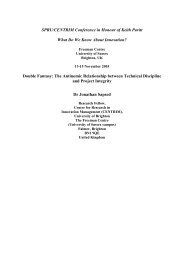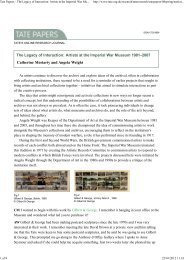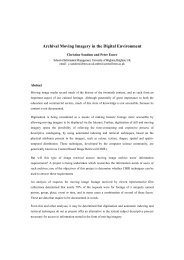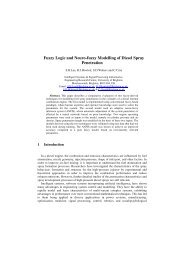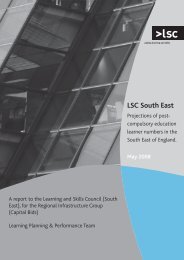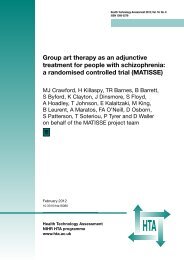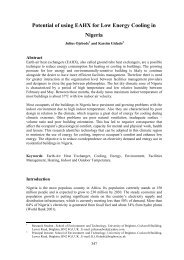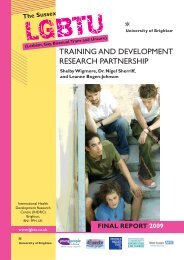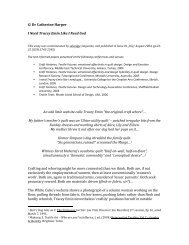TOP TIP - University of Brighton Repository
TOP TIP - University of Brighton Repository
TOP TIP - University of Brighton Repository
You also want an ePaper? Increase the reach of your titles
YUMPU automatically turns print PDFs into web optimized ePapers that Google loves.
Learning Points<br />
PROMISING PRACTICE<br />
✱ Peer evaluation can be a really effective method <strong>of</strong> developing practice.<br />
Involving young fathers who have participated in the project or<br />
programme can be a valuable resource for exploring what works and<br />
what needs to change. Young fathers asking other young fathers about<br />
what they need, what works, and what doesn’t, is likely to be more<br />
powerful and meaningful than being asked by a pr<strong>of</strong>essional – e.g. young<br />
people may feel questions are more legitimate coming from their peers.<br />
However, as paper-based evaluation forms such as questionnaires are<br />
biased towards literacy skills, they may not be suitable for some young<br />
people. Workers need to consider more creative, alternative methods or<br />
approaches for evaluation (see Top Tips, p51).<br />
✱ In general, funders’ requirements are <strong>of</strong>ten more likely to be quantitative in nature. However, evaluation doesn’t just means<br />
using numbers. Projects and services tell us that qualitative data (e.g. generated through interviews, case-studies, focus<br />
groups etc) can provide richly nuanced understandings about the effectiveness and success <strong>of</strong> project outcomes.<br />
✱ Monitoring and evaluation should be a strategic element <strong>of</strong> any young fathers work, preferably be planned from the outset,<br />
and progress reviewed regularly. However, it’s never too late to start. The sooner planning for evaluation takes place the<br />
better, but it is never too late (McKie et al., 2002).<br />
✱ Key aspects <strong>of</strong> evaluation are likely to include an assessment <strong>of</strong> engagement strategies, contacts and relationships with<br />
other agencies and organisations, referrals to and from other agencies and services, and impact on young fathers.<br />
Evaluating such impact is likely to include assessing changes in fathers’ confidence, esteem, parenting skills and changes<br />
in young fathers’ relationships (e.g. with the child and/or mother).<br />
✱ It is important that workers have the appropriate skills to carry out monitoring and evaluation activities. There are a number<br />
<strong>of</strong> organisations <strong>of</strong>fering useful resources, training, and consultancy to help individuals develop these skills.<br />
✱ It is well known that services (e.g. maternity, Connexions) tend not to routinely collect information on young fathers, or their<br />
circumstances (e.g. Featherstone, no-date; Quinton et al., 2002), in part, because <strong>of</strong> the intensive resources needed to do<br />
this and maintain accurate information. However, to aid the evaluation process, young fathers projects and services should<br />
routinely record at least basic information relating to areas such as age (father and child), marital status and current<br />
situation (e.g. lone parent, living with mother, step-father living apart from child), housing, employment, agencies involved<br />
with, ethnic background, and so on. TSA’s young fathers project developed a useful pro forma to assist projects in collating<br />
such information (see Mordaunt, 2005).<br />
Supporting Young Fathers 53




